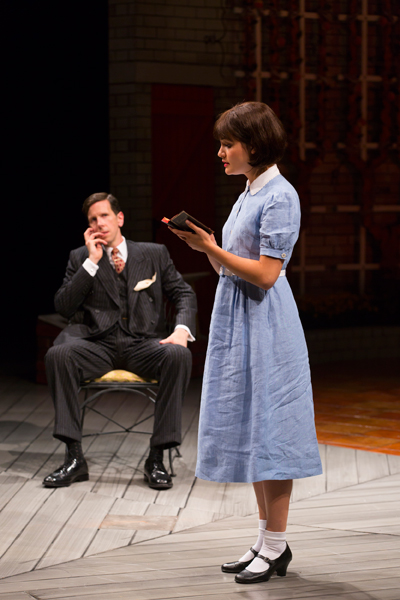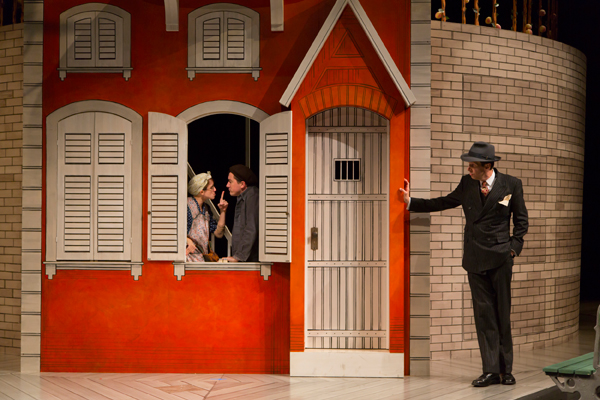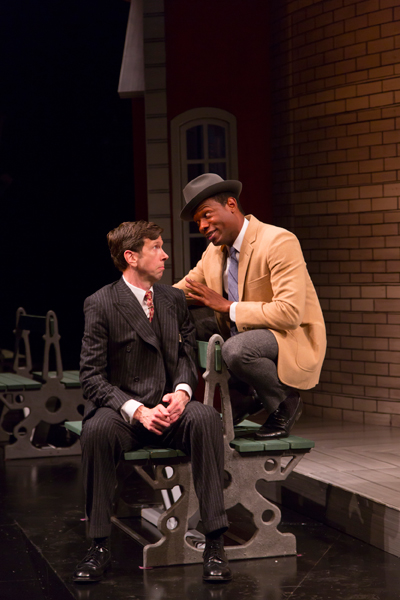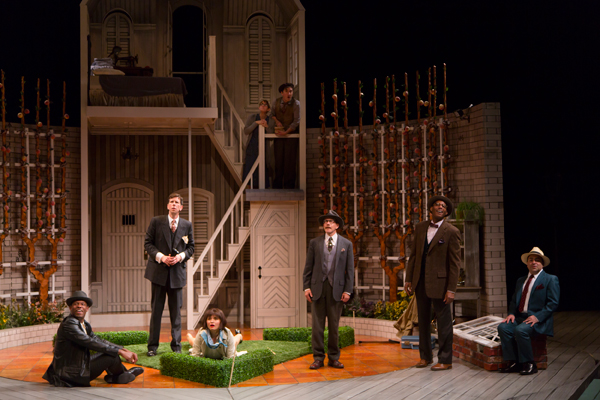Grooming the Perfect Wife


What happens when a wealthy, middle-aged bachelor in the 20th century thinks he’s found the perfect way to groom a wife in order to prevent her from cheating on him? That’s the question behind Moliere’s “The School For Wives,” which is being presented by Two River Theater now through October 5 in Red Bank, NJ.
Originally written in the 17th century, Two River’s production is set in France in the late 1950s, with a production design inspired by the films of Jean Luc Godard and the photography of Henri Cartier-Bresson.
“Arnolphe adopts a 4 year-old girl and has her raised in a convent to be a blank slate, a total innocent,” explains Robert Stanton, who plays Arnolphe. “He buys a second property to keep her in a sort of a prison and a love shack.”
Arnolphe purchases a new title to raise his social class standing, but it creates misperceptions. While away on a business trip, his plan for the girl goes awry when she meets someone new.
“He’s constructed a dam to protect this girl and keep her to himself, but holes keep popping up in it and he doesn’t have enough fingers to plug all of the holes,” said Stanton. “Eventually as he finds himself in the throes of jealously and rage and despair at all of his perfect plans being thwarted, he finds that he’s actually falling in love with the girl.

“When I first read the play, I thought to myself ‘why are we doing this now?’” continued Stanton. “There’s this controlling, narcissistic man who wants to have this perfect little Stepford doll be his wife who will see to his every wish, and he keeps her locked away. The sad fact is that paternalism still exists in our society today.”
Stanton points out the issue of women’s rights — how women have never been able to earn as much money as men, the lack of a true equal rights law, and how the few rights women have for themselves (such as their reproductive rights) are in danger of being taken away.
“I think the play is sadly timely and there is an urgent need to do it now,” he adds. “One of the things the director (Mark Wing-Davey) has done very cleverly is to set the play in a time and place that is not our own, but is familiar.
“It’s set it in France, which is a society we all know has a divide between the equality of genders that is even more pronounced than in America,” said Stanton. “And yet it is right on the edge of the women’s liberation movement. ‘The Feminine Mystique’ was written by Betty Friedan in 1963 and it’s right around the time when Gloria Steinem was about to change things for women. I think it’s a time that’s familiar to all of us because it’s the 20th century and we see it in films and television. From shows like ‘Mad Men’ we know what women were up against. It’s familiar and it’s distant at the same time. I think Mark’s very cleverly set (this production) in a time and place that translates and is comfortably close to the 17th century even though it’s only 50 years ago.”
Director Mark Wing-Davey chose a translation by celebrated poet Richard Wilbur (who twice received the Pulitzer Prize for Poetry, once in 1957 and again in 1989) for this production. Wilbur, who is in his 90s, grew up in North Caldwell, NJ and graduated from Montclair High School in 1938.
Stanton loves the translation. “It is effervescent!” he exclaims. “He manages to capture the meaning of the play. Mark owns a vacation home in France and has spoke French fluently for most of his life. Whenever we came to a part where we didn’t know what the intent was, Mark did a direct translation of the original French and it would actually be dead on, and yet, at the same time, be delightfully witty to a contemporary American audience. It’s written in American English—not a vernacular—but English we can all identify with.”
The director had each of the actors do research on a particular topic such why “The School for Wives” was such a scandal at the time it was first produced: French gardening practices (due to having a servant’s garden in the play); the French films of the New Wave period; how to secure a title; what it would be like for a servant to be running a household in France in the 1950s; and Moliere’s life and his own marriage to a much younger woman, which was Stanton’s assignment.
Each actor gave a 20-minute talk on his or her findings. These assignments helped everyone gain a better perspective of the time and place to inhabit in the play. It also served to bring the cast closer together and unify them around a single vision.
In addition to Stanton, the cast for “The School for Wives” includes Bree and Carson Elrod, Korey Jackson, Billy Eugene Jones, Steven Rattazzi, Keith Reddin, and Phillipa Soo.
“I had never done Moliere and it was always something I wanted to do,” said Stanton. “If a role is an opportunity to grow as an actor and a human being, (and I think all great opportunities are opportunities to grow as a person if you’re challenged), then I would like to be challenged.”
Productions take place at the Joan and Robert Rechnitz Theater at Two River Theater (21 Bridge Avenue) in Red Bank, now through Saturday, October 5, 2014.


